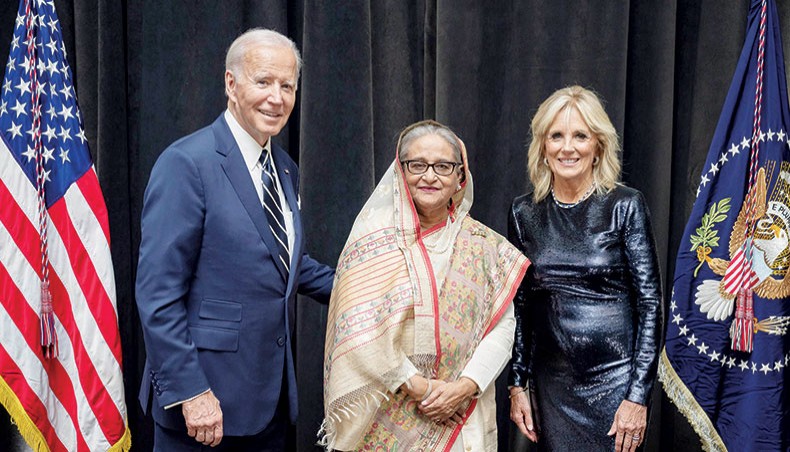Written by: Rashidul Hasan Rahat
INTRODUCTION
The relationship between the United States and Bangladesh is currently undergoing changes, prompting a reevaluation of bilateral ties and potential implications for both countries. As Bangladesh’s foreign policy evolves, concerns arise regarding the state of the US-Bangladesh relationship. This article explores the shifting dynamics between the two nations, analyzes the factors driving these changes, and discusses the significance of Bangladesh’s neutral foreign policy approach in navigating the future.
HISTORICAL CONTEXT AND IMPORTANCE OF THE RELATIONSHIP
Since its inception, the United States has played a vital role in Bangladesh’s development. The US has provided assistance across various sectors, such as education, healthcare, and infrastructure. Additionally, it has supported Bangladesh’s endeavors in counterterrorism, climate change mitigation, and human rights. Moreover, the United States serves as Bangladesh’s largest export destination for readymade garments and has been a substantial contributor of foreign aid. These historical ties underscore the importance of the US-Bangladesh relationship for both nations.
STRAINS AND SHIFTS IN THE RELATIONSHIP
Recent comments by Prime Minister Sheikh Hasina expressing dissatisfaction with alleged US interference in Bangladesh’s politics have raised concerns about the state of the relationship. In response, Bangladesh has revoked special rights granted to diplomats from certain countries, including the United States, indicating a potential shift in diplomatic protocols. These developments suggest a reevaluation of the relationship with potential broader implications.
FACTORS INFLUENCING THE SHIFT
Several factors contribute to the evolving dynamics of the US-Bangladesh relationship. Firstly, the global geopolitical landscape is witnessing a shift with China and Russia gaining prominence as influential players. Bangladesh’s exploration of using the ‘BRICS Currency’ for de-dollarization could be interpreted as a step toward closer alignment with the China-Russia bloc. Secondly, concerns about alleged US interference in Bangladesh’s politics have strained bilateral ties, prompting a reevaluation of priorities. Lastly, economic considerations are significant, as any strain in the relationship could impact Bangladesh’s export market and foreign aid.
IMPLICATIONS FOR BANGLADESH
Strains in the US-Bangladesh relationship may have economic implications for Bangladesh. As the United States is the largest market for Bangladeshi readymade garments, any disruptions in trade or market access could have far-reaching consequences. Furthermore, a shift in the relationship could open doors for competitors like Vietnam to capture Bangladesh’s market share. To safeguard its economic interests, Bangladesh must navigate these dynamics carefully and explore alternative partnerships.
IMPLICATIONS FOR THE UNITED STATES
The United States also has a stake in maintaining a strong relationship with Bangladesh. Given Bangladesh’s strategic location in South Asia, its growing economy, and its efforts in counterterrorism and regional stability, it serves as an important partner for the United States. Strains in the relationship may lead to diminished influence in the region and potential opportunities for other powers to fill the void.
IMPORTANCE OF BANGLADESH’S NEUTRAL STANCE
Maintaining a neutral foreign policy approach holds several implications for Bangladesh in navigating the future. Firstly, it allows Bangladesh to engage with multiple superpowers, including the United States, China, and Russia, while minimizing dependency on any one country. This balanced engagement helps protect national interests and enhances strategic autonomy. Secondly, neutrality enables Bangladesh to promote regional stability by avoiding alignment with specific blocs and fostering inclusive cooperation. Lastly, it allows Bangladesh to focus on domestic development and economic growth by leveraging partnerships with various countries based on mutual interests and benefits.
WHY BANGLADESH SHOULD MAINTAIN NEUTRALITY
Sustaining neutrality is crucial for Bangladesh’s long-term stability and prosperity. By avoiding excessive alignment with any particular superpower, Bangladesh can minimize the risk of being caught in geopolitical conflicts or becoming a pawn in power struggles. Neutrality enables Bangladesh to prioritize economic development, social progress, and national security without compromising sovereignty. Furthermore, it positions Bangladesh as a bridge between nations, facilitating dialogue and cooperation in regional and international forums.
NAVIGATING THE FUTURE
Effectively navigating the future requires Bangladesh to uphold its neutral foreign policy approach while actively engaging with all relevant stakeholders. Open dialogue, mutual understanding, and proactive measures are necessary in maintaining a strong and mutually beneficial relationship with the United States, China, Russia, and other nations. By maintaining a balanced approach, Bangladesh can protect its economic interests, foster regional stability, and contribute to global peace.
CONCLUSION
The US-Bangladesh relationship is experiencing shifting dynamics with potential implications for both countries. Strains resulting from alleged interference and reevaluations of diplomatic protocols necessitate a careful examination of priorities and interests. Bangladesh’s exploration of alternative partnerships and economic considerations add further complexity. Navigating the future requires open dialogue, mutual understanding, and a proactive approach to maintaining a strong and mutually beneficial relationship. By doing so, both Bangladesh and the United States can effectively address challenges and leverage opportunities for their mutual benefit.
References:
1.Contextualizing PM Hasina’s remarks on the US. (2023, April 13). Dhaka Tribune. https://www.dhakatribune.com/…/contextualizing-pm…
2.Desk, T. (2023, May 16). Why were special protocols for diplomats withdrawn? Dhaka Tribune. https://www.dhakatribune.com/…/why-were-special…
3.ডলারের আধিপত্য কমাতে ব্রিকসে আরও ২৫ দেশ. (n.d.). Ekattor TV. https://ekattor.tv/news/article?article_id=44420…
